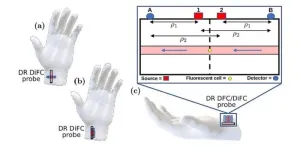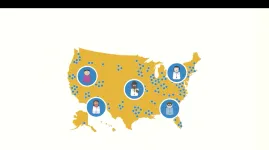(Press-News.org) Water is the world’s most valuable natural resource. Although a human can survive weeks or even months without food, going as little as three days without water could spell the end. The effects of water scarcity aren’t limited to immediate survival situations, however. Recently published research in Psychological Science suggests that cultures from water-scarce environments tend to be more likely than cultures from water-rich areas to value long-term thinking and to scorn short-term indulgence.
“Individuals from historically water-scarce climates tend to be more long-term oriented and less indulgent,” said Hamidreza Harati (The University of Queensland) in an interview. “Even in modern environments with easy access to water, cultural responses shaped by historical water scarcity still influence individuals’ decision-making processes.”
Harati and Thomas Talhelm (The University of Chicago) reached this conclusion after carrying out four studies on water scarcity, long-term orientation, and indulgence.
The first study focused on a “natural test case” of 331 undergraduate students from two cities in Iran: water-scarce Yazd and water-rich Shiraz. When surveyed about their values, participants from Yazd rated themselves more than twice as high for long-term orientation (e.g., by agreeing more with the statement “Persistent efforts are the surest way to results”) than participants from Shiraz. Students from water-rich Shiraz, on the other hand, rated themselves almost twice as high for indulgence (e.g., by rating themselves higher for valuing “keeping time free for fun” than for “having few desires”).
Participants also responded similarly when asked about the values of an average person from their city. These differences remained significant when the researchers controlled for participants’ gender, age, marital status, and economic status.
Harati and Talhelm also found that water-scarcity-based cultural differences were reflected in people’s behavior. In a second study of 182 job applicants, the researchers found that applicants from water-scarce Yazd were twice as likely to apply for a stable position at an established company than for a flexible role at a start-up. Participants from water-rich Shiraz, by comparison, were slightly more likely to apply for the start-up position.
The researchers observed similar short-term effects in an experiment in which they tasked 211 students at the University of Tehran with reading the abstract from one of two fictional scientific studies that made predictions about changes in the availability of water from 2022 to 2032. Students who read the abstract that predicted a severe water shortage reported having a stronger long-term orientation than those who read the abstract that predicted a surplus. Students in the control condition, who completed the survey without reading any abstract, had responses that fell between those of the other two groups. Students who read the abstract that predicted a water shortage also reported being less indulgent, but this was not statistically significant.
Finally, to explore how these findings might apply across cultural contexts, Harati and Talhelm analyzed how the availability of fresh water in 87 countries between 1962 and 2014 correlated with national scores for each population’s long-term orientation and indulgence. Numerous ongoing and historic conditions—including average temperature, economic development, population density, frequency of natural disasters, corruption, agriculture, religion, disease risk, and war—can influence a country’s cultural values. However, when Harati and Talhelm controlled for these factors, fresh water per capita remained a significant predictor of a nation’s long-term orientation and indulgence.
“The results add to the growing field of ecological psychology, which posits that the environment plays a role in shaping people’s psychology,” Harati and Talhelm wrote. Focusing on understudied regions like the cities of Shiraz and Yazd in Iran also contributes to a broader understanding of cultural differences, underscoring the importance of including diverse samples and cultural perspectives in psychological research, Harati told APS.
Future research on water scarcity and culture could help address climate change by identifying more effective policies and other interventions to encourage sustainable behaviors, Harati added.
“There is emerging evidence that groups that value the long term are already investing more in green strategies to fight the biggest environmental threat to our future—climate change,” the researchers wrote. “The cultural value that helped humans adapt to environmental threats of our long-term past might help us adapt to the world’s biggest environmental threat of the future.”
Reference
Harati, H., & Talhelm, T. (2023). Cultures in water-scarce environments are more long-term oriented. Psychological Science, 34(7), 754–770. https://doi.org/10.1177/09567976231172500
END
Water-scarce cultures value long-term thinking more than their water-rich neighbors do
2023-07-24
ELSE PRESS RELEASES FROM THIS DATE:
New method for noninvasive detection of circulating tumor cells in blood
2023-07-24
Metastasis occurs when cancer cells acquire the ability to spread and form new tumors in different places in the body, usually by traveling within blood or lymph vessels. Since metastasis is a hallmark of advanced cancer and severely complicates treatment, its early diagnosis is essential. One way to do this is by looking for circulating tumor cells (CTCs) in blood samples.
However, CTCs can be very rare, and they might be completely absent in small blood samples despite being present in a patient’s bloodstream. To address this problem, researchers have developed a technique called diffuse in-vivo flow cytometry (DiFC). It involves labeling CTCs with ...
Colorado River Basin has lost water equal to Lake Mead due to climate change
2023-07-24
American Geophysical Union
Release No. 23-28
24 July 2023
For Immediate Release
This press release and accompanying multimedia are available online at: https://news.agu.org/press-release/colorado-river-basin-has-lost-water-equal-to-lake-mead-due-to-climate-change/
Colorado River Basin has lost water equal to Lake Mead due to climate change
A rapid rate of reductions in runoff associated with the Colorado Basin’s snowpack region, quantified here for the first time, is largely responsible for the water loss.
AGU press contact:
Rebecca Dzombak, news@agu.org +1 (202) 777-7492 (UTC-4 hours)
Contact ...
Beyond protected areas: Novel method shows promise for monitoring biodiversity on working lands
2023-07-24
New research led by Adam Dixon, a conservation scientist with the World Wildlife Fund, describes the successful pilot of a novel method to study how well grassland birds are faring on croplands. The study, published in Ecological Applications, looked at 44 pockets of non-crop vegetation in the gaps between crop rows and at the edges of fields on lands under intensive agricultural cultivation in Iowa. The study may serve as a model for monitoring wildlife on working lands more generally, which can include crop fields, cattle ranches, and logged forests.
The researchers analyzed satellite imagery data to determine each pocket's area and “texture,” ...
Is snacking bad for your health? It depends on what and when you eat
2023-07-24
Snacking is becoming increasingly popular, with more than 70% of people reporting they snack at least twice a day. In a new study involving more than 1,000 people, researchers examined whether snacking affects health and if the quality of snack foods matters.
“Our study showed that the quality of snacking is more important than the quantity or frequency of snacking, thus choosing high quality snacks over highly processed snacks is likely beneficial,” said Kate Bermingham, PhD, a postdoctoral fellow at King's College London. “Timing is also important, with late night snacking being unfavorable for health.”
Bermingham ...
One way to reduce medical errors? Connect doctors with other doctors
2023-07-24
We trust our doctors with our lives, but the sad and scary fact is that doctors can get things wrong. Approximately 100,000 Americans die each year due to medical errors and recent studies have found that 10 to 15% of all clinical decisions regarding patient diagnosis and treatment are wrong.
A team of researchers led by Damon Centola, Professor and Director of the Network Dynamics Group at the Annenberg School for Communication at the University of Pennsylvania, has found a simple, effective way to reduce errors in patient diagnosis and treatment — use structured networks to connect clinicians with other clinicians.
In a study published today in the journal ...
Study finds new, unexpected mechanism of cancer cell spread
2023-07-24
A surprising finding from USC reveals key details about how cancer cells metastasize and suggests new therapeutic approaches for halting their spread.
The research, supported by the National Institutes of Health, centers on a cellular chaperone protein known as GRP78, which helps regulate the folding of other proteins inside cells. Previous studies from the same team, led by Amy S. Lee, PhD, professor of biochemistry and molecular medicine at the Keck School of Medicine of USC, have shown that when cells are under stress (due to COVID-19 or cancer), GRP78 gets hijacked, allowing viral invaders to replicate, ...
Sahara dust can enhance removal of methane
2023-07-24
The study by Maarten van Herpen et al., entitled “Photocatalytic Chlorine Atom Production on Mineral Dust-Sea Spray Aerosols over North Atlantic,” was funded in part by the NGO Spark Climate Solutions. It incorporates a proposed new mechanism whereby blowing mineral dust mixes with sea-spray to form Mineral Dust-Sea Spray Aerosol (MDSA).
The results suggest that MDSA is activated by sunlight to produce an abundance of chlorine atoms, which oxidize atmospheric methane and tropospheric ozone via photocatalysis. Largely composed of blowing dust from the Sahara Desert combined with sea salt aerosol from the ocean, MDSA is the dominant source of atmospheric ...
Unlocking secrets of the elusive ghost shark
2023-07-24
Researchers from the University of Florida and the Seattle Aquarium are exploring 100 meters underwater in the Pacific Northwest this summer to learn more about mysterious ghost sharks, one of the strangest beasts from the depths of the ocean.
Using remotely operated underwater vehicles, or ROVs, the scientists searched for nesting grounds of the Pacific spotted ratfish, Hydrolagus colliei, a ghostlike fish that lurks on the ocean floor.
“We know very little about these elusive relatives of sharks and even less about their spawning habits and embryonic development,” said ...
Risk of fatal heart attack may double in heat wave & high fine particulate pollution days
2023-07-24
Research Highlights:
An analysis of more than 202,000 heart attack deaths between 2015-2020 in a single Chinese province found that days that had extreme heat, extreme cold or high levels of fine particulate matter (PM2.5) air pollution were significantly associated with the risk of death from a heart attack, especially in women and older adults.
The greatest increase in the risk of death from heart attack was seen on days that had the combination of extreme heat and high levels of PM2.5.
The days with extreme heat were associated ...
Study shows positive outcomes for first three U.S. living HIV-to-HIV kidney transplant donors
2023-07-24
Based on findings from a study published today in the journal, The Lancet Regional Health – Americas, researchers at Johns Hopkins Medicine and three collaborating medical institutions suggest that people living with the human immunodeficiency virus (HIV) who donate a kidney to other people living with HIV (PLWH) have a low risk of developing end-stage kidney disease (ESKD) or other kidney problems in the years following the donation.
“This new evidence is proof-of-concept that donating a kidney can be safe for people living with HIV,” says Christine Durand, M.D., associate professor of medicine at Johns ...







